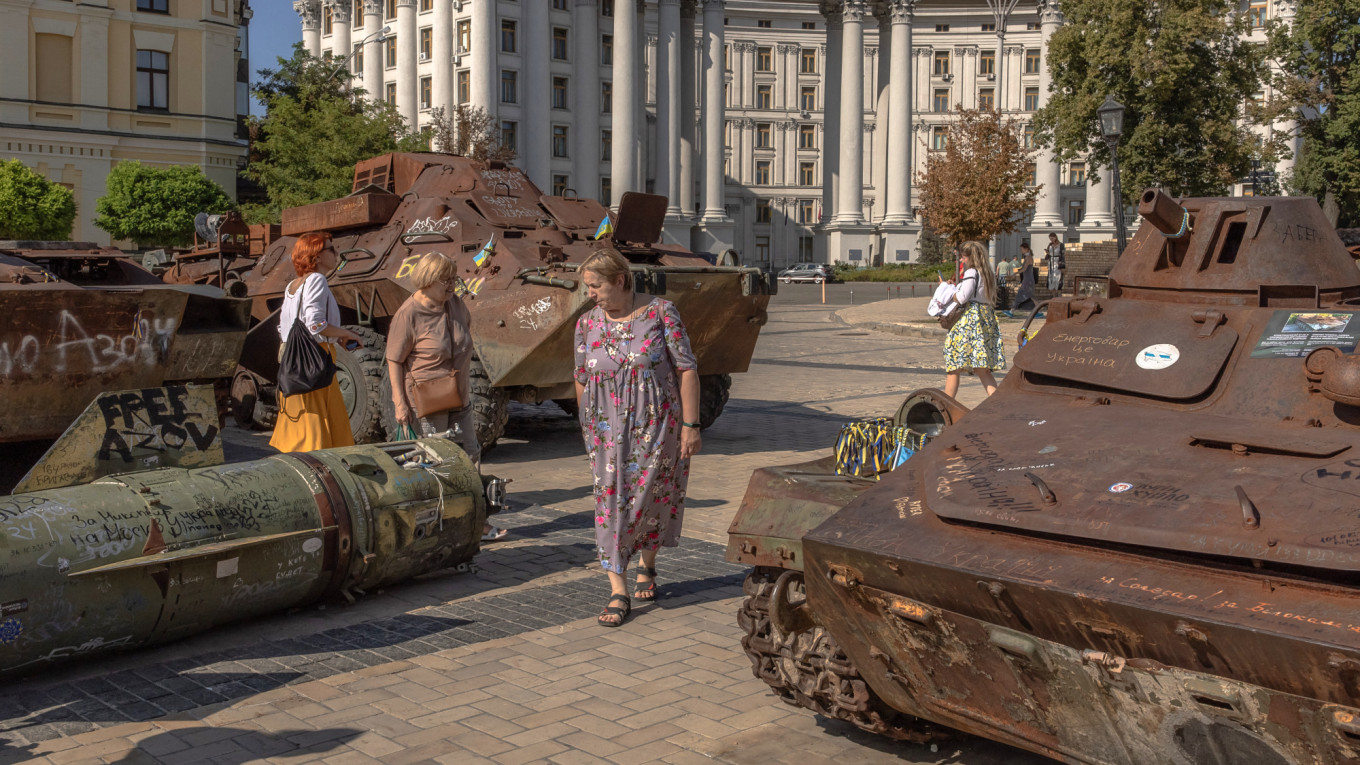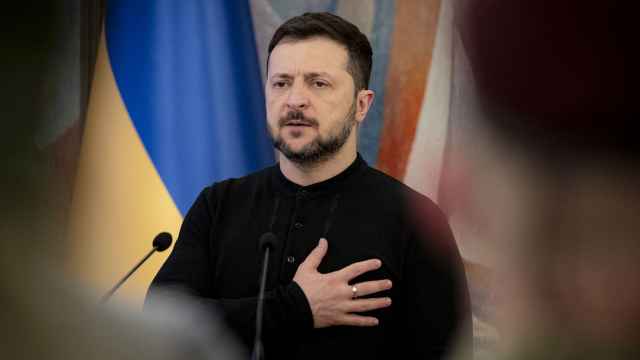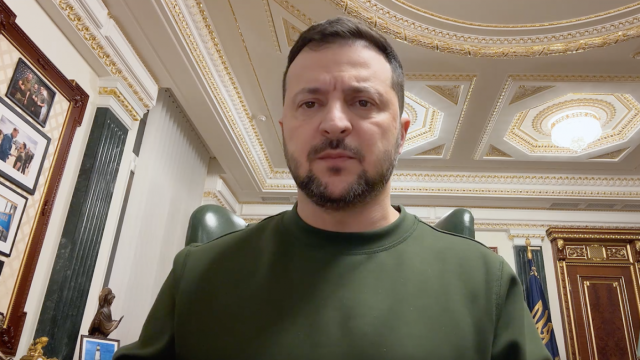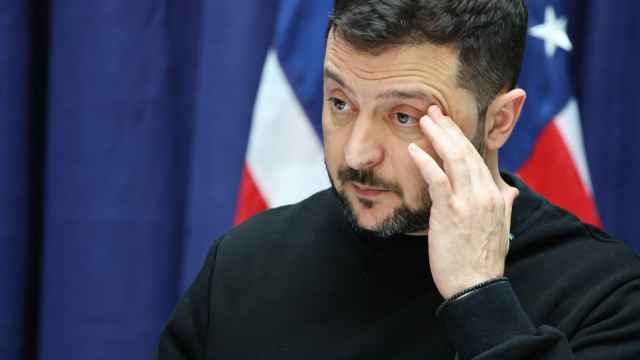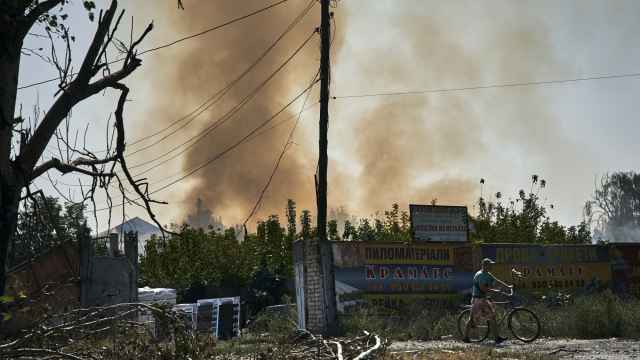Ukrainian President Volodymyr Zelensky vowed more "retribution" against Russia on Saturday as he celebrated Independence Day near where his forces launched a surprise offensive into Russian territory two weeks ago.
Zelensky also signed a law banning the Russia-linked branch of the Ukrainian Orthodox Church, calling the legislation a "liberation from Moscow's devils," drawing a sharp response from Russia's Orthodox leader.
Kyiv marked its independence from the Soviet Union at a tense moment in the long war as it mounts a push into Russia and Moscow eyes more east Ukrainian towns.
Zelensky published a video of him standing in a hilly, forested area said to be near where Ukraine launched its shock incursion on August 6.
"What the enemy brought to our land has now returned to its home," he said, adding that Russia will "know what retribution is."
Putin briefed on Kursk
He called President Vladimir Putin a "sick man from Red Square who constantly threatens everyone with the red button," referring to nuclear war.
Zelensky later said that one of the goals of Kyiv's Kursk operation was to show Russians "what is more important to him [Putin]: the occupation of the territories of Ukraine or the protection of his population."
Kyiv has also said the Kursk offensive is aimed at stretching Russia's reserves from eastern Ukraine.
Kyiv has said the operation also aimed to capture Russian soldiers to trade for Ukrainian prisoners of war. Kyiv and Moscow on Saturday announced the exchange of 230 POWs.
In Russia, President Vladimir Putin held a meeting with army chief Valery Gerasimov, with the Kremlin saying they had discussed "countering enemy forces invading the Kursk region and measures being taken to destroy them."
The Kremlin's choice of language was a break from previous statements that downplayed the surprise Ukrainian move.
While it has visibly rattled Moscow, Ukraine's Kursk operation has not slowed Russia's advance in eastern Ukraine.
Deadly strikes
As Ukraine celebrated its independence, Kyiv said a Russian strike on a residential area of the eastern city of Kostyantynivka, near the front line in the Donetsk region, killed five people.
AFP witnessed a young boy and his dog walk up to a body, covered by a sheet, on the side of the road and watch as rescuers rushed to remove it.
People embraced standing next to another body, covered by a silver sheet, before emergency services took it away in a black body bag.
As Zelensky vowed more retribution, Ukraine's military intelligence said Saturday it had carried out a "successful" attack on an ammunition depot in Russia's southern Voronezh region, near the town of Ostrogozhsk.
And an overnight Ukrainian strike in the Russian border region of Belgorod killed five people and wounded 12 others, including three children, its governor announced early Sunday morning.
Earlier this month, a state of emergency was declared in Belgorod due in part to Ukrainian bombardments, and Russia said it was sending more troops to defend the region in light of the incursion into neighboring Kursk, where tens of thousands have either fled or been evacuated.
Ukraine, meanwhile, has recently carried out some evacuations from the hub of Pokrovsk amid fears it will fall to advancing Russian forces.
Prisoner swap
Both Kyiv and Moscow said Saturday that they had each returned 115 captive servicemen in a deal brokered by the United Arab Emirates.
Zelensky published photographs of men wrapped in Ukrainian flags, and Kyiv's ombudsman Dmytro Lubinets said some were fighters from the epic 2022 battle for the Azovstal steelworks in Mariupol.
Zelensky has said the Kursk offensive bolstered Ukraine's "exchange fund" of captured Russian soldiers to trade.
Widespread reports of young conscripts going missing in Kursk have filled the Russian internet in recent days.
Moscow released images of young-looking men on a bus, saying it freed 115 servicemen "taken prisoner in the Kursk region."
Russia said the troops were currently in Belarus and will be brought to Russia soon.
'Protecting Ukrainian Orthodoxy'
At Kyiv's Sofia Square in front of St. Michael's Cathedral, Zelensky said a new law banning the Russian-linked church "protects Ukrainian Orthodoxy from Moscow's dependence."
Ukraine has been seeking to distance itself from the Russian church since 2014 and those efforts have accelerated since Russia's 2022 invasion.
Moscow's Orthodox Church leader Patriarch Kirill on Saturday accused Ukraine of "persecuting" believers with the ban, urging the international community to speak out.
Kirill is a firm backer of the invasion and staunch Putin ally, and earlier this week the Russian Church compared Ukraine's law to "persecutions in the Roman Empire in the times of Nero and Diocletian."
As Ukrainians marked independence day, US President Joe Biden said "the war will end with Ukraine remaining a free, sovereign, and independent country."
German Chancellor Olaf Scholz also reaffirmed Berlin's "continued and unwavering solidarity", despite a planned reduction in Berlin's budget for military aid to Kyiv next year.
Other European leaders also showed their support, with the EU's top diplomat Josep Borrell saying that Ukraine's "existential fight" was also "existential for the EU."
"Dear Ukrainians... the day approaches when we welcome you in the EU," European Council President Charles Michel wrote on X.
A Message from The Moscow Times:
Dear readers,
We are facing unprecedented challenges. Russia's Prosecutor General's Office has designated The Moscow Times as an "undesirable" organization, criminalizing our work and putting our staff at risk of prosecution. This follows our earlier unjust labeling as a "foreign agent."
These actions are direct attempts to silence independent journalism in Russia. The authorities claim our work "discredits the decisions of the Russian leadership." We see things differently: we strive to provide accurate, unbiased reporting on Russia.
We, the journalists of The Moscow Times, refuse to be silenced. But to continue our work, we need your help.
Your support, no matter how small, makes a world of difference. If you can, please support us monthly starting from just $2. It's quick to set up, and every contribution makes a significant impact.
By supporting The Moscow Times, you're defending open, independent journalism in the face of repression. Thank you for standing with us.
Remind me later.


